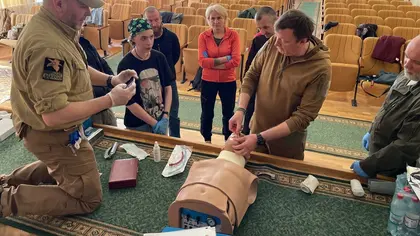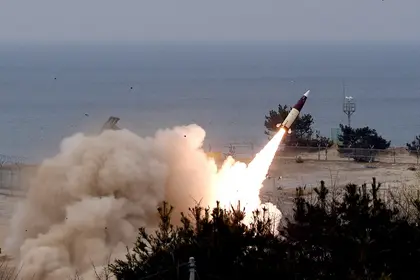The figure is impressive: 91 percent of deaths on the battlefield are due to massive bleeding. That means many of those who are lightly wounded die because they do not receive immediate help, which even non-medical people can give. This is the first thing you learn in the four-hour basic first aid course, held every weekend in Odesa.
To get a better idea of this important volunteer activity, we signed up for the half-day military first aid training, organized by the NGO VidNova+, which can be attended not only by military personnel, but also civilians. The training is also useful in the event of car or domestic accidents, not to mention civilians who are injured by rocket attacks or bombings on Ukrainian cities. The difference between life and death is sometimes determined by the waiting time for an ambulance without any intervention to stop the bleeding.
JOIN US ON TELEGRAM
Follow our coverage of the war on the @Kyivpost_official.
After half an hour of theoretical introduction, where they explain what you can do directly and what you can’t do in case of serious wounds that require a surgeon, you go directly to group exercises with military medical personnel. This is how you learn to plug a wound in the limbs or neck, thanks to the techniques developed from experience on the battlefield. The first aid kit includes tactical bandages that allow you to stop the bleeding, but you have to learn how to use them. Moreover, an important but little-known aspect of first aid is how to transport a casualty when you are alone and do not have a stretcher. Even in that case there are techniques that allow you to carry a person much heavier than you to safety.

Russians Reportedly Shift Military Equipment and Ammo from Crimea to Kursk
At the Odesa course, where anyone can enroll freely, there were many young people. More than just training, it allowed participants to share moments of awareness: the reality in which we are living, with the risk of personal life due to war, demands that you be useful to others. The human contact with other highly motivated and helpful medical instructors was also edifying.
The courses are conducted by NGO VidNova+, created by the non-profit REVA Foundation in Odesa, which since the beginning of the war has given logistical support to get medical aid to Ukraine for military and civilian assistance.
In the first days of the invasion, individual first aid kits (IFAKs) also arrived together with the humanitarian aid, and the director general of the Reva Foundation, Gennady Nechaevsky, asked the voluntary associations, which received this medical equipment, if they knew how to use it or if they were sure that it would end up in expert hands. From their answers Nechaevsky understood that these precious aids risked ending up unused, perhaps in storage in some warehouse.
To solve this problem, it was necessary to organize regular training to create qualified first aid specialists. In addition, the most up-to-date tactical medicine protocols were to be taught and implemented throughout the country under invasion. Indeed, tactical medicine practice in Ukraine was not always consistent with these guidelines. As such, VidNova+ was born.
Since the start of the war, its volunteer instructors have provided basic tactical medicine training to more than 7,500 servicemen and 500 civilians. Since October 2022, VidNova+ instructors have also started providing training in other locations in Ukraine. Even simple doctors needed special training to become combat medics and be prepared to save lives in extreme conditions, such as during a battle. Furthermore, it is needed to have soldiers with medical training present in combat groups, with the task of keeping a wounded comrade alive before reaching an equipped medical point.
In the end, it was an enriching training experience that, unfortunately, may prove useful in a country still under attack by Russia. which deserves to be promoted also among the non-combatant population, to have many lifesavers trained in our communities.
You can also highlight the text and press Ctrl + Enter






